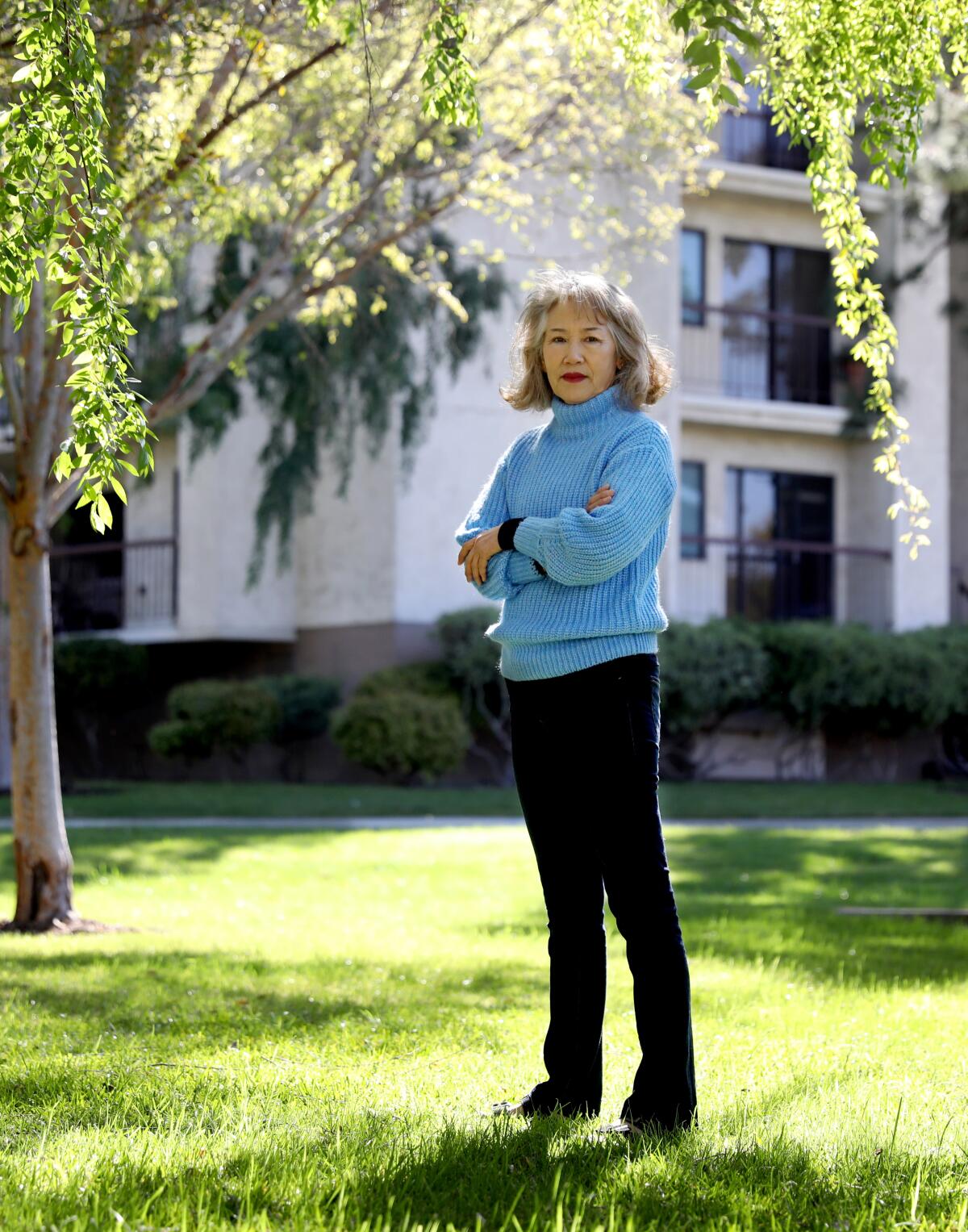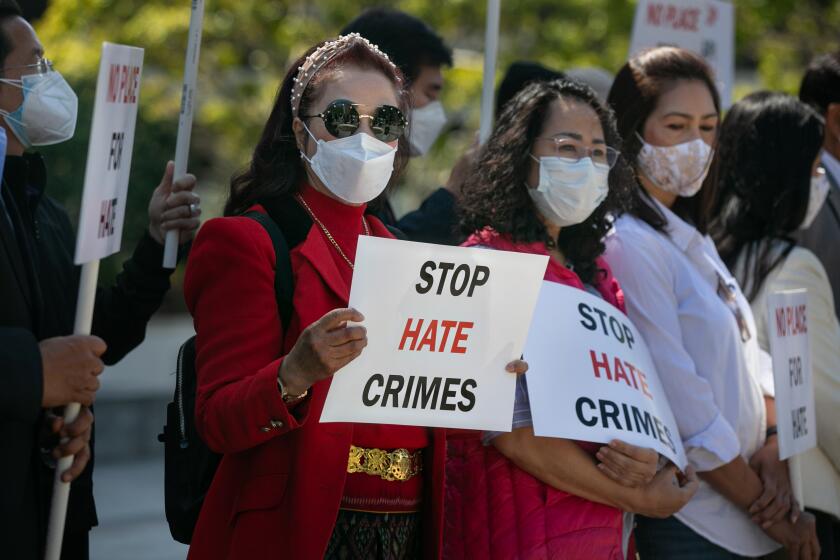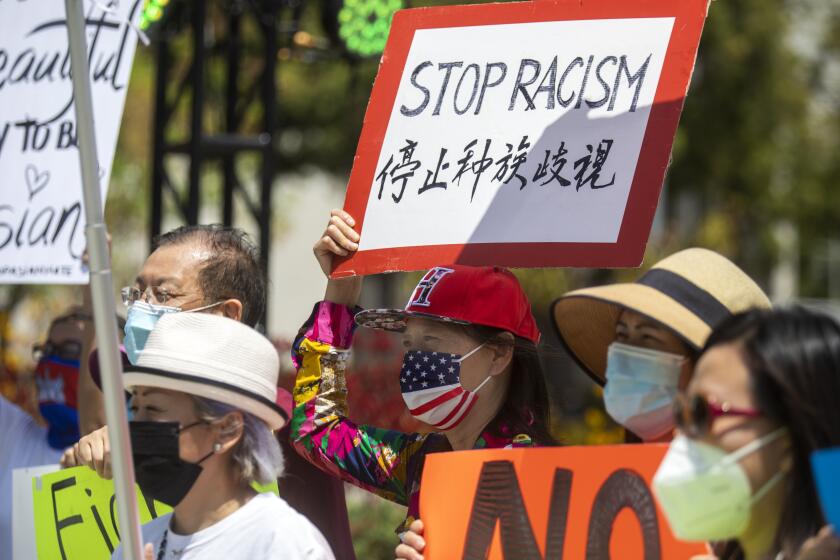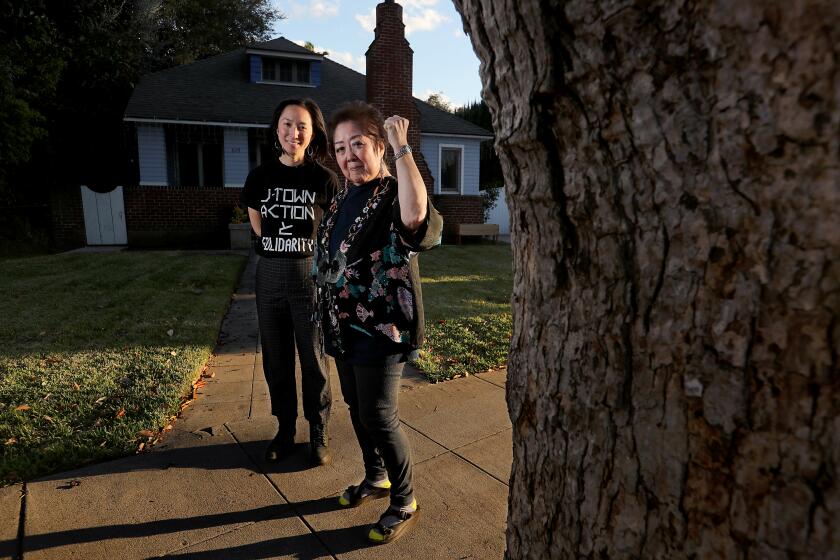Asian Americans are having ‘the talk’ about racism for the first time — with their parents

- Share via
Becky Chen decided it was finally time to talk to her mother about racism.
A gunman had just killed eight people, including six of Asian descent, in the Atlanta area. It was the latest in a string of attacks on Asians in the U.S. since the COVID-19 pandemic began.
Chen, a student at Arcadia High, was so nervous that she framed the conversation as an interview for an essay she was writing.
In addition to anti-Asian racism, she wanted to bring up her mother’s attitudes toward Black people and Latinos.
Her mother’s answers during the April 2021 conversation were surprising. For the first time, she shared the discrimination she faced in immigration facilities as a new arrival from Korea.
She said she moved to Arcadia, with its large Asian population, so her daughters wouldn’t feel like a minority. And she condemned the murder of George Floyd by Minneapolis police officers.
“For the first time, I felt like I bonded with my mom about her immigrant experience,” said Chen, 18, a chairwoman of the Arcadia Civic Youth Council, which advocates on homelessness, mental health and other issues.
The rise in anti-Asian hate, fueled by misconceptions about the pandemic’s origins, has exposed generational divides in how Asian Americans view racism.
Since before pandemic lockdowns and closures hit California, racism and violence have been targeted at people of Asian descent here, around the U.S. and beyond.
First-generation Asian immigrants like Chen’s mother are often focused on building a stable life in their adopted country. Some experienced war in their homelands, so a few ugly words or even a physical assault seem insignificant compared with what they have seen.
Their children and grandchildren, born in the U.S., are more likely to feel completely American and not tolerate any insinuation that they are foreigners.
Now, the Atlanta shootings and other attacks against Asian Americans have spurred some to have difficult conversations with their elders about something that was always too painful to discuss.
Some, like Chen, are bringing up their elders’ racism toward other groups.
A recent survey of Asian American residents in the San Gabriel Valley found that first-generation immigrants were less likely to report a change in how they feel or behave when leaving home after the rise in anti-Asian hate, compared with other generations.
A new poll from Cal State Los Angeles surveyed Asian American and Pacific Islander voters on homelessness, anti-Asian racism and hate crimes.
That leaves some younger Asian Americans deeply concerned for their elders’ safety while frustrated by their seeming nonchalance.
“Those older folks just said it didn’t happen or, ‘We didn’t pay attention to the discrimination,’” said Manjusha Kulkarni, a co-founder of Stop AAPI Hate. “That there’s no discrimination, because ‘we did well enough to own a home, a pool and a two-car garage.’”
Mary Forrest, a 50-year-old Glendale resident, bristles when anyone calls the coronavirus “the China virus.”
But her mother, 73, an immigrant from China, doesn’t get offended, preferring to view such remarks as coming from a place of ignorance, not bigotry, Forrest said.
“I’ve asked her: I’ve wondered if this person is being dismissive or disrespectful, because she’s Chinese,” Forrest said of her mother. “It doesn’t even occur to her. I can’t think of a single incident where she told me someone was racist towards her.”
In decades in the U.S., Forrest’s mother has largely made her own way without being part of a large Asian community.
“There’s a certain amount of self-determination to immigrate into another country. That self-determination seems to create that resilience in Asian immigrants,” Forrest said of her mother. “They’re not looking for ways to not fit in.”
Forrest is sensitive to the fact that her mother doesn’t like to be perceived as a victim.
“I also see so much of her worldview is what makes herself think of herself as a strong, independent, self-sufficient person,” Forrest said. “Generationally and culturally, my parents take personal responsibility for themselves and see things happening to them as not products of pattern or something that’s happening in the culture.”
Hong Lee said her parents wanted her to keep quiet about a 2020 incident in which a man cursed at her and told her to “go back to Asia” while she was waiting to get tacos at a Pico-Union restaurant.
Days of unprecedented protests over Asian hate could be the beginning of a larger movement. Here is what the activists want.
“My parents were really scared. People would find out who I am, and something bad would happen to us, because we are talking about it on the media,” said Lee, 36, the daughter of immigrants from Vietnam.
In Vietnamese culture, Lee said, “we don’t put out our dirty laundry for people to see.”
But Lee decided to speak out, not just for herself but for others in the community.
When another victim of the same man reached out to Lee, her parents began to understand her decision.
Together, they researched the history of discrimination against Asian Americans, including the incarceration of Japanese Americans during World War II and the killing of Vincent Chin in 1982 by two white men who misidentified him as Japanese and blamed him for the decline of the U.S. auto industry.
“They were shocked.... They didn’t hear about those,” she said of her parents. “They can [now] see part of our history and how we are treated differently.”
Lee is now the president and co-founder of Seniors Fight Back, which runs martial arts classes for Asian American senior citizens so they can defend themselves against attacks.
Some activists and community leaders are trying to bridge the gap by relating recent events in the U.S. to what happened to older immigrants in Asia.
When Bo Thao-Urabe, senior programs strategist at the AAPI Civic Engagement Fund, talked with Hmong elders after the death of Floyd, they didn’t understand why people were protesting or why businesses were being burned.
Then, she asked, in Hmong: What did you do when your government back home didn’t support you?
By alluding to their resistance against the communist government in Laos, Thao-Urabe led the elders to see a link between their own experiences and the George Floyd protests.
For Asian immigrants, experiencing racism themselves can be a wake-up call, with the silver lining of helping them relate better to younger members of their family.
Joung Kim came to the U.S. from South Korea when she was in her 20s.
Now 68 and living in the Leisure World retirement community in Seal Beach, she had rarely thought much about racism. For her, America was the land of abundance.
Decades ago in La Crescenta-Montrose, her older daughter came home from elementary school upset about being called an “Indian doll.”
Kim responded: You look like an Indian doll.
But in March 2021, when a Korean American friend got a letter saying to “pack your bags and go back to your country where you belong,” Kim began reflecting on how anti-Asian hate has affected her and her family.
“They must have had a tough time too,” Kim said of her family members.
‘Now that Byong is gone makes it one less Asian to put up with in Leisure World,’ said the letter, written in cursive on yellow notebook paper.
For the first time, she asked whether her teenage granddaughter had ever experienced discrimination in school.
“Of course, Grandma,” Kim recalled her granddaughter telling her.
The letter has left Kim deeply traumatized. She worries about going outside.
Kim’s younger daughter, Christine Kim, recalls being mocked at school, with other kids calling her Chinese and making faces at her.
Her mother’s solution: You tell them you are not Chinese. You are Korean.
“That doesn’t help me,” Christine Kim, now 45, recalled thinking. “They don’t know what Korean is, and that doesn’t help me at all.”
Christine Kim is saddened by the change in her mother, who now cautions her about going to crowded places, fearing a racist attack.
But she feels that they understand each other better.
“There was a disconnect — my mom’s not going to understand me, because she grew up in Korea, and she just had a different upbringing,” Christine Kim said. “But she does understand.”
More to Read
Sign up for Essential California
The most important California stories and recommendations in your inbox every morning.
You may occasionally receive promotional content from the Los Angeles Times.














